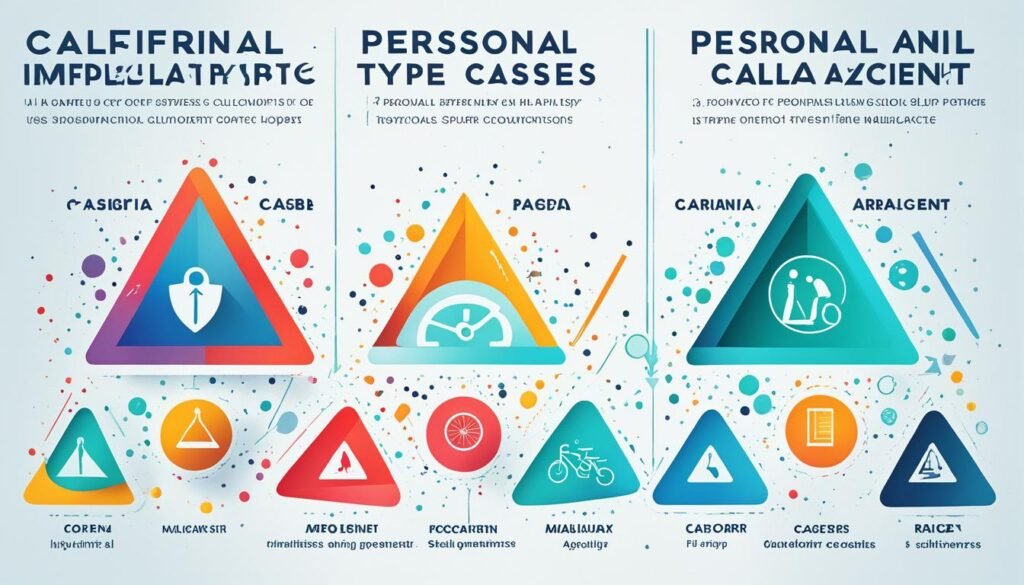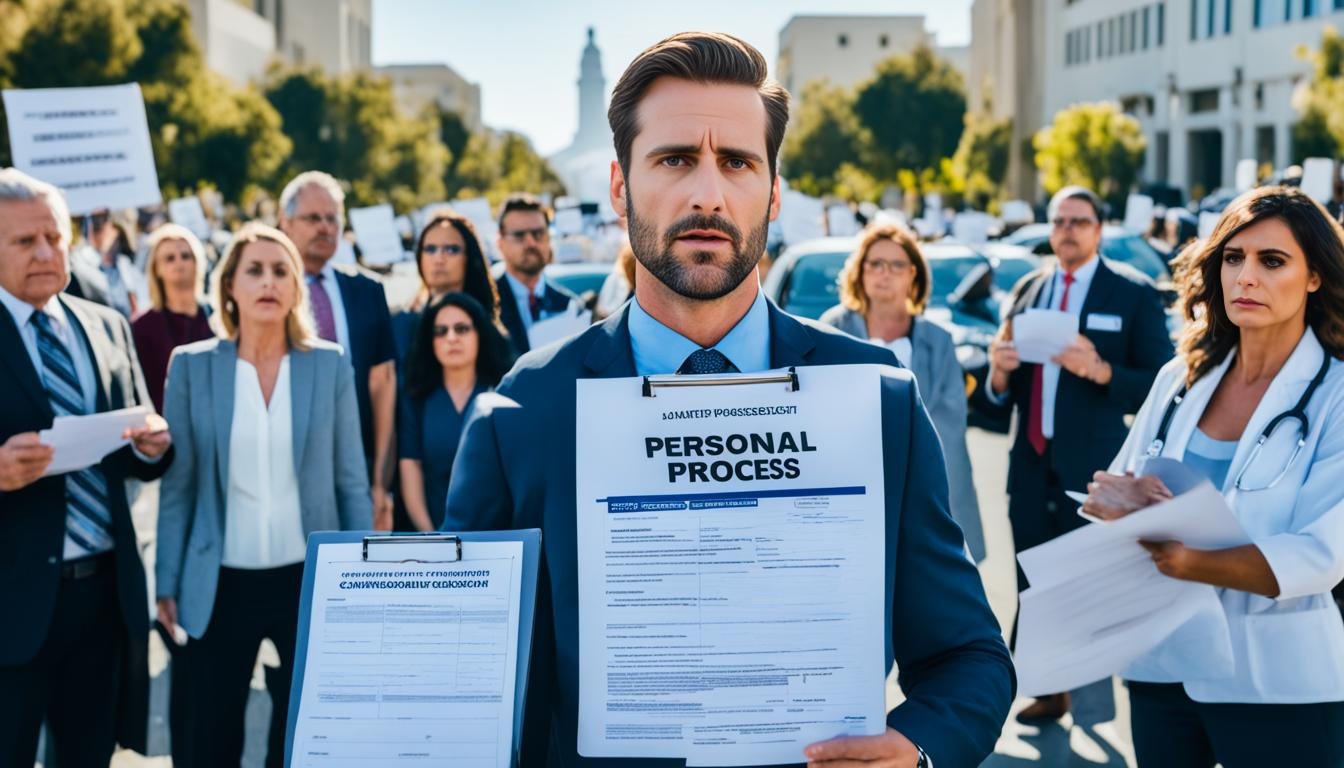Did you know personal injury cases in California can be tricky and costly? Whether it’s a car crash, slip and fall, or a workplace mishap, knowing how to deal with the legal details is key. It helps you steer through these cases with more confidence.
Starting a lawsuit, figuring out who is at fault, and asking for money back involves many important steps. By learning about these steps, you can fight for your rights better. You’ll also know which proofs you need to back up your case.
Key Takeaways
- Personal injury cases in California can be complex and expensive.
- Types of personal injury cases include car accidents, slip and falls, and workplace injuries.
- Understanding the filing deadlines and who to sue is crucial in California.
- Venue selection and insurance coverage are important considerations in these cases.
- Properly proving liability and documenting damages are vital for a successful outcome.
Types of Personal Injury Cases in California
In California, you can face personal injury from different events. This includes car accidents, slips, falls, and getting hurt at work. Knowing about the types of personal injury cases helps you through the legal steps. It also helps you get the money you need for your injuries.
Car Accident Injury Cases in California
In California, car accidents often lead to personal injury cases. If another driver’s careless actions injured you, you might have a case. You can sue the driver, the car’s owner, and sometimes the employer if the driver was working.
Slip and Fall Injury Cases in California
Slip and fall incidents happen because of unsafe conditions on someone else’s place. If you get hurt because you slipped or tripped on someone’s property, like a shop or a home, you could have a case. These cases usually mean suing the property owner for not keeping their place safe.
Workplace Injury Cases in California
Workplace injuries happen in all kinds of jobs. If you got injured at work, you might get money through a workers’ compensation case. This type of case is about getting benefits from your work’s compensation insurance. Sometimes, you can also sue someone else if they caused your work injury.
Remember: Every personal injury case in California is different. It has special rules and needs. Talking to a skilled personal injury lawyer is important. They help you know your rights, check how strong your case is, and guide you through the legal steps.
Learning about personal injury cases in California helps you understand what’s involved in making a claim. It also helps you go after the compensation you should get.
| Type of Personal Injury Case | Description |
|---|---|
| Car Accident Injury Cases in California | Involve pursuing compensation for injuries sustained in car accidents caused by another driver’s negligence or recklessness. |
| Slip and Fall Injury Cases in California | Arise from injuries suffered due to hazardous conditions on someone else’s property, such as businesses or private residences. |
| Workplace Injury Cases in California | Focus on seeking compensation for injuries sustained while on the job, typically through workers’ compensation benefits or potential third-party lawsuits. |
Remember to consult with a personal injury attorney to assess the specifics of your case and ensure your rights are protected throughout the legal process.

Filing a Lawsuit and Deadlines in California
In California, you must know when to file a personal injury lawsuit. This timeframe is set by what’s known as the statute of limitations. If you file too late, your case might be rejected.
For most personal injury claims, you have 2 years from the injury date to file. But, there are exceptions. For example, suing the government or unique situations could change this deadline.
An expert attorney in personal injury can help with these deadlines. They know the law well and can make sure you file on time.
It’s important to meet the deadline. Missing it means you could lose the chance to get compensation. Filing a lawsuit in California on time lets you fight for justice and possible compensation.
Here’s a table that shows the main deadlines for personal injury lawsuits in California:
| Personal Injury Case | Statute of Limitations |
|---|---|
| General Personal Injury | 2 years from the date of the injury |
| Medical Malpractice | 3 years from the injury date or 1 year from when you found the injury, whichever is first |
| Claims Against Government Entities | 6 months from the injury date |
| Product Liability | 2 years from the injury date or from when you found out about it |
These deadlines can change and might not apply in all situations. Always talk to a lawyer to understand the exact deadlines for your case.

Determining Liability and Who to Sue in California
In California, figuring out who is to blame in injury cases can be tough. Often, the injured person will sue everyone they think is responsible. For example, in a car crash, you might sue the driver, the car’s owner, and the employer if the driver was working. It’s key to do deep research in business cases to sue the right person or company.
Sometimes, the blame goes beyond the main party in an accident. In California, you might also sue others who helped cause the injury. This can include makers of broken products, owners of unsafe properties, and employers who didn’t keep a safe workplace.
When suing a business over an injury, finding out who owns it is key. California businesses can be owned in different ways, like by one person, partners, or a corporation. A good lawyer can figure out who to sue to make sure you include all responsible parties.
Insurance Coverage and Personal Injury Cases
In California injury cases, insurance is very important. It can pay for the injured person’s medical bills, lost pay, and other harm. When suing, figuring out the insurance coverage is crucial.
In a car crash, the driver who caused it may have insurance that pays for your injuries. Other injuries might be covered by different kinds of insurance. Knowing what insurance is available helps choose who to sue for the best chance at full compensation.
Insurance companies often try to pay as little as they can. They might blame others or say your injuries aren’t covered. A skilled injury lawyer knows how to deal with insurance companies to get you what’s fair.
“Determining liability and identifying the correct defendants is a critical aspect of personal injury cases in California. Thorough research and an understanding of business ownership structures are necessary to hold the appropriate parties responsible. Additionally, considering insurance coverage is crucial for maximizing compensation. Consult with an experienced attorney to effectively navigate these complex aspects of your personal injury case.”
| Responsible Party | Possible Defendants |
|---|---|
| Car Accident | Driver at fault, Car owner, Employer (if driver was on the job) |
| Slip and Fall | Property owner or occupier |
| Workplace Injury | Employer, Third parties responsible for dangerous conditions |
| Product Liability | Manufacturer, Distributor, Retailer |
| Premises Liability | Property owner, Property manager |
Venue and Insurance Considerations in California Personal Injury Cases
In California, for personal injury cases, choosing the right place and understanding insurance is key. The place or “venue” could be where the injury happened, or where the person you’re suing lives or works. Picking the right venue can really affect your case’s result.
It’s usually best to file your case in the county where you got hurt. This makes sure the court knows the local rules that might apply. But sometimes, you might want to file where the other person lives or works instead.
Deciding on the right venue takes some thought. You should talk to a lawyer who knows personal injury cases. They can help you look at your options and make a good choice for your situation.
Another big thing to think about is insurance. In California, insurance can play a big role in personal injury cases. It can affect whether you need to file a lawsuit and how much money you’re looking for.
If you go after an insurance claim, you might get the money you need faster and without a lawsuit. Insurance can help pay for things like your medical bills, lost wages, and damaged property.
But dealing with insurance can be tricky. It’s important to work carefully to make sure you get a fair deal. A lawyer who knows about personal injury can help you understand your rights, talk to insurance companies, and prepare a strong case.
When you’re looking at a personal injury case in California, thinking about where to file and insurance is really important. Knowing how to choose the right place and use insurance can make the legal process smoother and help you win your case.
| Venue Considerations | Insurance Considerations |
|---|---|
| File in the county where injury occurred | Explore insurance coverage for compensation |
| Consider filing where the defendant lives or does business | Consult with a personal injury attorney |
| Understand local laws and regulations | Negotiate with insurance companies |
| Seek legal advice for venue selection | Ensure fair and adequate compensation |
Causes of Action and Proving Liability in California Personal Injury Cases
In California, starting a lawsuit for personal injuries needs at least one cause of action. Causes of action are legal reasons to ask for money for damages. To make a strong case, the person suing (plaintiff) must prove the cause of action fully. People being sued (defendants) must understand what the plaintiff needs to show to win. It’s key to collect and keep evidence to back up claims and show who was at fault in personal injury cases.
Finding evidence is critical in California personal injury cases. This includes photos of the accident, medical bills, witness statements, and police reports. The evidence must show the defendant’s mistake or wrong act caused the injury. It’s crucial to clearly link the defendant’s actions to the harm suffered. Strong evidence makes the plaintiff’s case better and helps win a favorable decision.
“Accident scene photos, medical bills, witness statements, and police reports are crucial pieces of evidence in personal injury cases. They help establish liability and enable the court to assess the extent of damages suffered by the plaintiff.”
Often, California personal injury cases need expert witnesses. A medical expert can talk about the injuries and what care will be needed later. An expert on accidents can figure out how the accident happened and who is to blame. These experts give the plaintiff’s claim more weight and help prove who was at fault.
In short, winning a personal injury case in California depends on showing causes of action and proving fault. Gathering evidence like photos, bills, and statements is vital for supporting claims. Also, experts can make the case stronger by giving their professional views on complicated issues. By carefully showing their evidence and pointing out the defendant’s mistakes or wrong acts, plaintiffs can make a strong case for getting compensation.
| Causes of Action in California Personal Injury Cases | Proving Liability in Personal Injury Cases in California | Evidence Requirements in Personal Injury Cases in California |
|---|---|---|
| Showing negligence | Establishing a link between the defendant’s actions and the injury | Accident scene photos |
| Strict liability | Demonstrating that the defendant is responsible regardless of fault | Medical bills |
| Intentional misconduct | Proving that the defendant acted deliberately to cause harm | Witness statements |
Damages and Compensation in California Personal Injury Cases
In California, when you’re in a personal injury case, think about the damages you’ve faced. You need to figure out the right compensation. Personal injury damages cover your physical, emotional, and financial health.
“The value of a personal injury case in California is largely determined by the damages incurred.”
Medical expenses are a major type of damage in personal injury cases. They cover initial treatment, ongoing care, meds, rehab, and any needed equipment. Keep all receipts and documents. They prove how much money your case should get.
Lost wages are important too. If you can’t work because of your injury, you might get money for lost income.
Emotional distress damages can also be part of your claim in California. It’s hard to put a number on psychological trauma, anxiety, depression, and other mental effects. But, these are important too.
Collect all evidence that shows your damages. This includes medical bills, pay stubs, and expert words. They show how the injury has changed your life.
By knowing your damages and asking for the right compensation, you can aim for a fair end to your case in California.
| Type of Damages | Description |
|---|---|
| Medical Expenses | The cost of medical treatment, rehabilitation, medication, and related expenses. |
| Lost Wages | Reimbursement for income lost as a result of the injury. |
| Emotional Distress | Compensation for psychological trauma, anxiety, and other mental health effects. |
| Pain and Suffering | Non-economic damages for physical and emotional pain endured due to the injury. |
Conclusion
Filing a personal injury case in California can be tricky. It involves understanding many complex legal rules, like filing deadlines and who is to blame. An experienced attorney is essential to guide you through this process. They can help you file on time and gather the right evidence.
To get the compensation you deserve, act quickly and work with a skilled lawyer. They’ll assist you in documenting your injuries and damages. This could include medical bills, lost earnings, or even emotional stress. With the right preparation and a strong legal team, you can improve your chances of winning your case.
Dealing with a personal injury case in California can seem daunting, especially for first-timers. Getting an experienced attorney on your side makes a big difference. They’ll show you the ropes and help you fight for what you deserve. By taking the right steps and seeking fair compensation, you can look forward to a positive outcome in your case.

